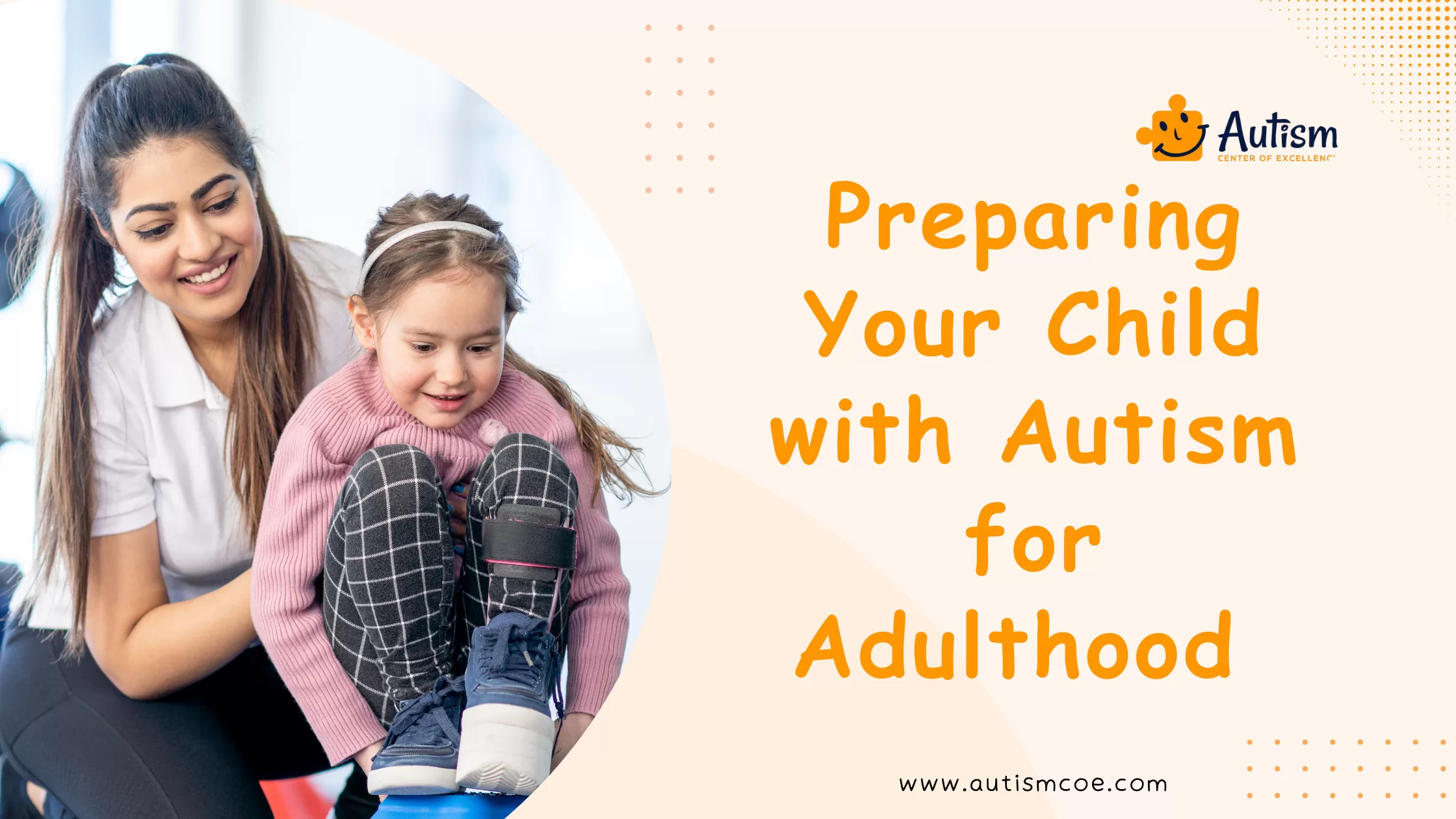The preparation of a Child with Autism into adulthood is one, which requires thoughtful planning and support. Unlike their peers, children on the autism spectrum may face unique challenges as they transition into adulthood. The earlier these are recognized, the greater the opportunities for developing strategies tailored to those needs. The journey to adulthood does not have to be daunting but, instead, it can be a time for growth and achievement for everyone involved.
This post will look at why these transitions are important, the challenges that may accompany them, and effective strategies to help smooth the way for teens who happen to be autistic. With the right planning and support, this transition can not only be possible but also highly rewarding for children with autism.
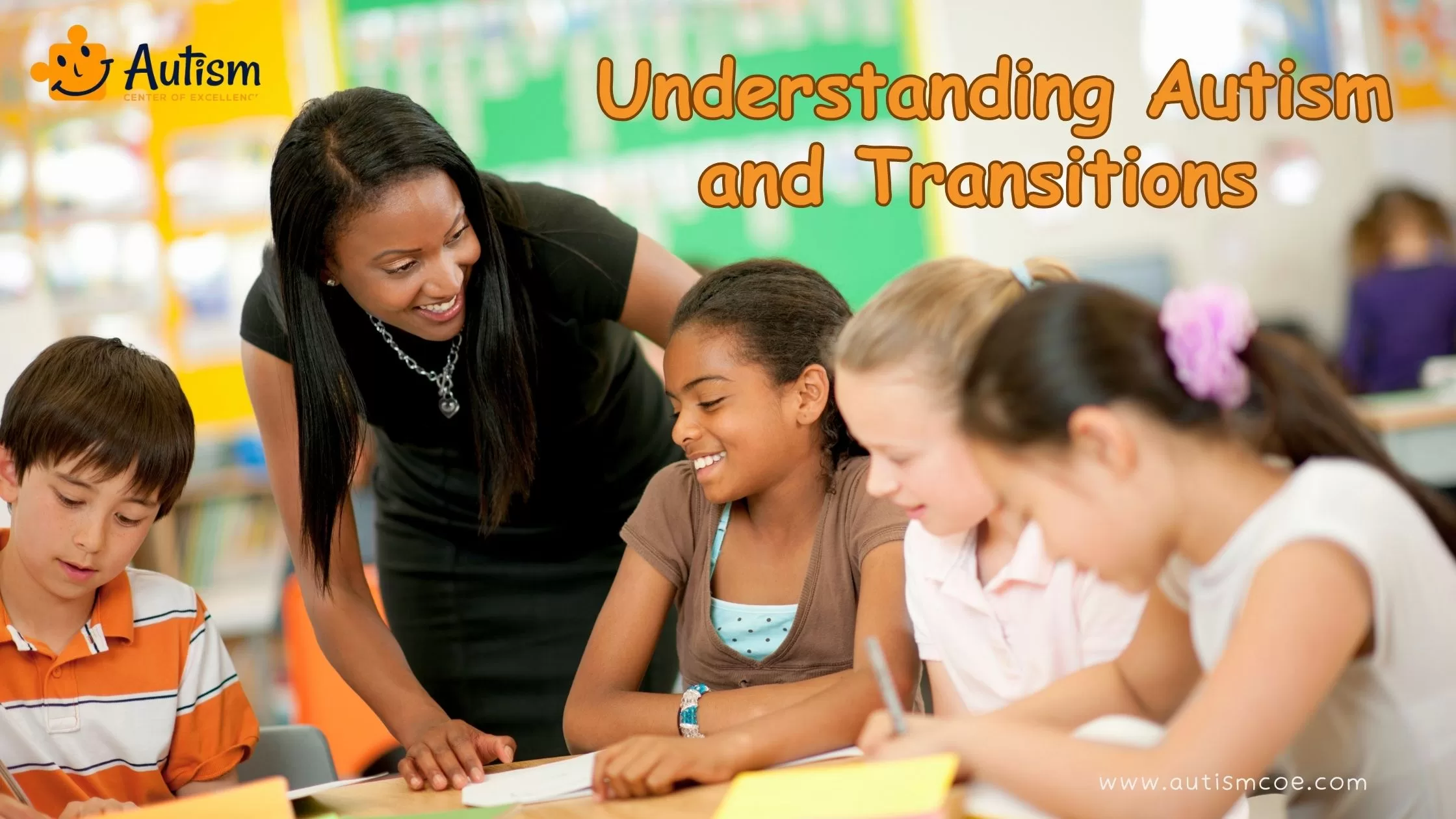
Understanding Autism and Transitions
Transition means a change of state or condition. The challenges that a child may have to go through come with changes. The changes include moving from one activity to another, change of school, or even the transition into adulthood. Transitions make children feel anxious and defiant.
Transitions are difficult for children with autism because this type of child appreciates the routine and predictability the daily routine creates. An autistic child loves consistency; therefore, any change is distressing. The understanding of this begins the process of Supporting these Children through transitions.
It is a great deal of work that goes into creating an auspicious environment to help children with autism adjust themselves; this requires patience and empathy. Through appreciation of their needs and working together, we can try to ease the transition process. Understanding is the prime step for the promotion of smoother transitions.
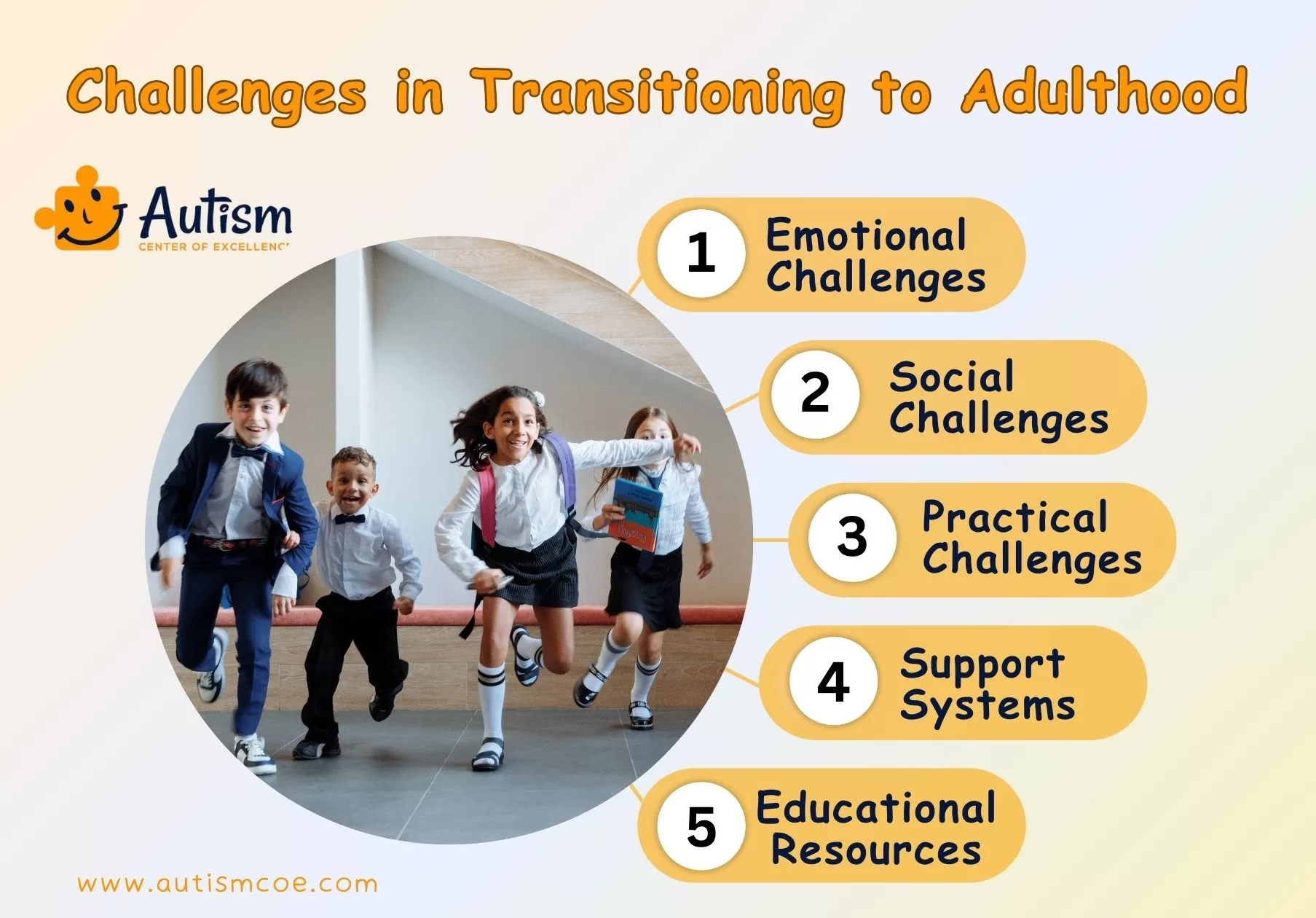
Challenges in Transitioning to Adulthood
Transitioning to adulthood can be a set of challenges for any autistic person as that particular period in life often demands new social, emotional, and practical landscapes. However, all these challenges and the best ways to respond to them might empower autistic teens so that they not only survive but thrive in this great transition. Here are some of the critical challenges they might face:
#1. Fear of the Unknown:
Most teens with autism find maturity transition thoroughly intimidating. Typically, this transition evokes increased anxiety since the anxiety is a result of fearing departure from secure and familiar environments and established routines. Avoidance behaviors or heightened levels of tension may emerge. To alleviate such sentiments, it is crucial to have open conversations regarding their issues and gradually expose them to new scenarios in a paced manner for proper adaptation to new situations.
#2. Creating New Connections:
Relationship building and keeping new relationships can be extremely hard for the autistic child because of problems in communication, as well as their difficulties in Understanding Social nuances.
Coming into adult life often means encountering new people in totally new environments from college campuses to offices, raising cases of alienation. For the sake of such support, social skills are to be taught explicitly and involvement in activities that will create or enforce building relationships must be sought through some forms of structured group work. Their experiences during this transition phase may also be effectively guided and shared through peer mentoring programs.
#3. Independent Living and Employment:
Without proper preparation and support, everyday life, such as managing finances, finding a job, or running a household, can be overwhelming. These life skills training may include budgeting, preparing simple meals, and practicing for a job interview to help a Child with Autism prepare for everyday life. Internships and job training can offer real experience in the workplace while, at the same time, enhancing individuals’ confidence in professional places.
#4. Support Systems:
Building a support network would enable one to seek guidance throughout this Transition Process. The support network may be limited to family and friends or a more formal relationship between educators and community organizations that specialize in helping individuals with autism. Participation in local support groups or online forums would also enable them to connect with others who have shared experiences and similar issues.
#5. Continuing Education:
Continuing learning can be a challenge with this transition because individuals with autism have challenges with the standard routes used in education. There are a variety of options, though, including community college courses, online learning, and vocational training programs that may fit a particular learning style and interest. Information such as the availability of resources for tutoring and other academic support services will bridge the gap between high school education and post-secondary education and make them better prepared and confident in their pursuit.
Addressing these challenges with thoughtful strategies and support mechanisms will serve to facilitate the confident, resilient transformation of autistic people into adulthood. Ultimately, one can only create an understanding and accommodating environment that will allow them to embrace this new phase in life with optimism and capability.
Join Our Weekly Newsletters!
Subscribe now to stay updated with our latest email updates.
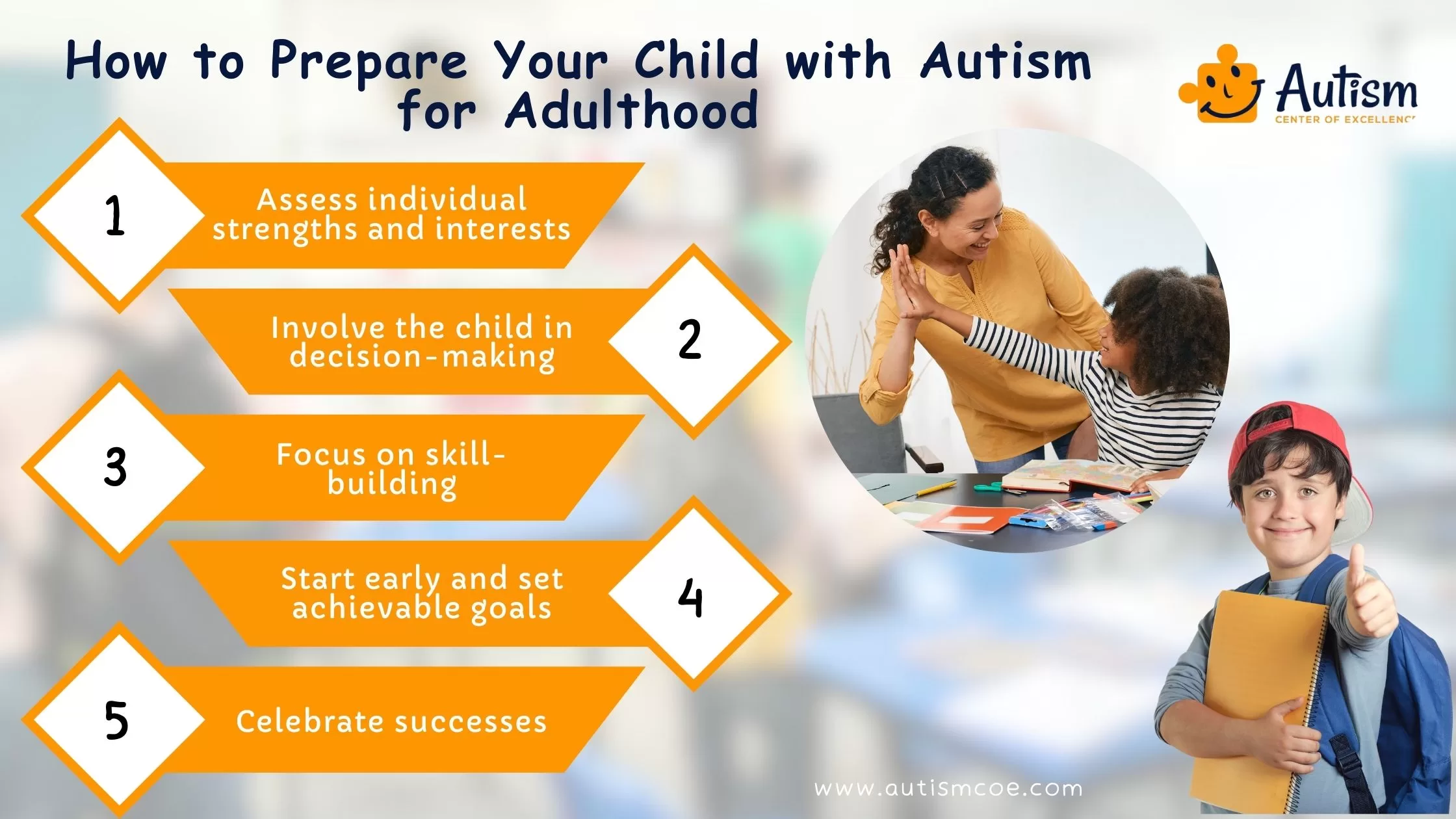
How to Prepare Your Child with Autism for Adulthood
Preparing your child with autism for adulthood is not only productive but also very pivotal to their future success and independence in this increasingly complex world. Here are very important steps to consider, each designed to Support your Child’s Journey towards a fulfilling adult life:
Assess Individual Strengths and Interests:
Make sure you know what your child is gifted at and really does well at. That requires watching what he or she does every day; engaging in conversations with him or her about what he or she enjoys doing, as well as getting observations from teachers or therapists who spend the day working with your child. Utilizing this innate talent and passion as an identified area, you can craft a tailored plan designed specifically to meet his or her strengths and passions and thereby strengthen motivation and engagement. This tailored approach can boost their confidence eminently to pursue further what they have undertaken.
Involve the Child in Decision-Making:
Therefore, it is essential to let your child be the decisive factor in your decision, especially as you all deliberate on his or her future. Engage your child in preference-making and consider their aspirations and goals in discussing their transition into adulthood. This can be made possible by establishing regular family meeting sessions where you can make them feel safe to voice their thoughts. It not only breeds a feeling of being in control but enables them to think critically and to solve problems during the decision-making process itself, which benefits them once they become adults.
Focus on Skill-Building:
Equip the child with practical skills for living life. Teach them basic life skills such as cooking and budgeting and self-care routines. Such will make them independent and self-reliant. This may also be through further academic and vocational training to suit the needs of the child and his or her interests. You could get valuable experience by being an intern or engaging in volunteer service, while making a possible way towards employment. They may find many alternative ways into various careers.
Start Early and Set Achievable Goals:
The sooner a child begins to prepare, the better. Establish achievable goals that a child can work toward. By cutting up bigger objectives into smaller, workable actions, it creates a sense of achievement and progress over time. Celebrate each milestone throughout the process to help reinforce Positive Behavior in them and makes them want to continue striving for independence even more.
Celebrate Successes:
Every achievement, no matter how small, is worth acknowledging. Positive reinforcement of successes in terms of independence and adult life may be built. Verbal praise, small rewards, or family celebrations are a mere way of telling them that you appreciate their efforts and progress. Emphasizing their successes motivates confidence as they face future challenges.
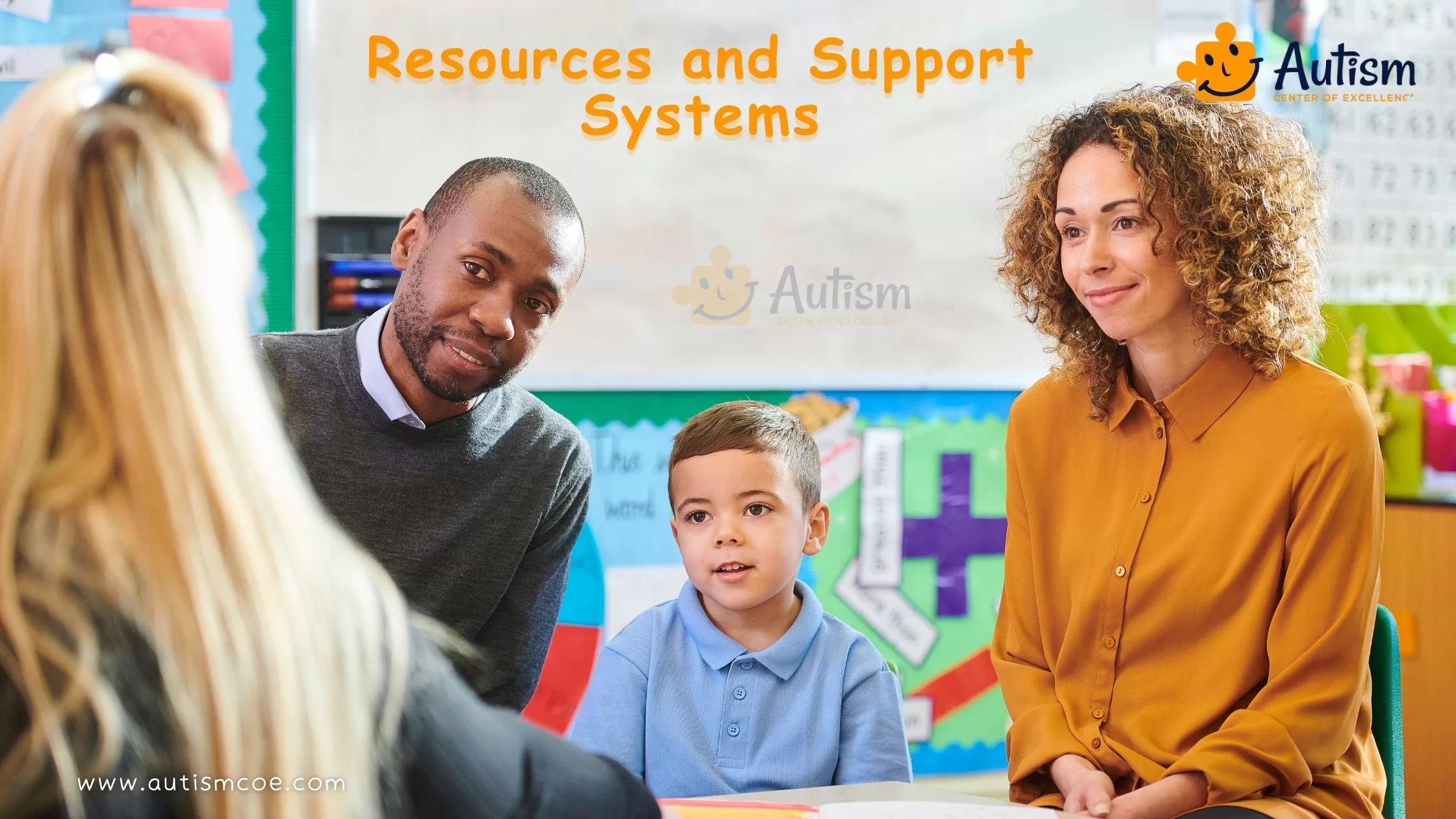
Resources and Support Systems
There are numerous Support Organizations and Communities that focus on helping autistic individuals make the transition to adulthood. There is much helpful information and resources through these supports.
You can also join a local support group or an online forum where most parents and caregivers share their experiences or tips. These communities can become sources of encouragement and provide you with practical tips.
This means that organizations such as Autism Speaks, and the Autism Society have devised programs as well as workshops that use transition planning. The programs are useful and provide tactics on how to help them along their way in this world of autistic life.
Educational resources as well as training programs should always be aimed towards building up the student’s skills. Vocational training centers and even community colleges could also serve as a reference for when the student needs to take classes that would hone their skills better for life and work.
Role of ABA Therapy in Preparing Your Child with Autism for Adulthood
ABA Therapy helps prepare children with autism to transition into adulthood, focusing on skill development for independence and social awareness. Tailored interventions in ABA teach self-care, communication skills, and problem-solving ability, preparing an individual to live confidently as an adult.
It also aims to address behavioral issues, leading toward adaptability and emotional regulation. Early Intervention promotes independence and ensures that people with autism undergo an effortless transition into adult life while providing them with the skills needed to remain productive and functional in everyday life and at work. At the Autism Center of Excellence, we are committed to providing personalized ABA therapy designed to accompany children and their families through every step of this critical transition.
Frequently Asked Questions & Answer
What is Transition in ABA?
Transition in Applied Behavior Analysis (ABA) is moving to a different activity, setting, or phase. On its part, it applies teaching children with autism to adapt well to the change by first giving them a course of preparations toward that change in using aids like visual schedules and reinforcement for positive responses to new situations.
What is The Hardest Part of Life for a Child with Autism?
Perhaps one of the hardest aspects of life for an autistic child is transitions and other variations in routine. Variability is overwhelming in part because of rigidity, most readily exacerbated by the combination of sensory challenges and communicative problems that damage and disrupt emotional and social well-being.
How Can I Help My Child with Autism Build a Network of Peers and Mentors?
Help your child develop a social group or network of peers and mentors by encouraging involvement in social groups, extracurricular activities, or clubs in their individual interests. You might also look for local autism support organizations that provide mentorship programs and arrange playdates or group activities for the establishment of increasing friendships.
How Can I Advocate for My Child's Needs in Adult Services or Programs?
Advocate for your child by sufficient research about the services provided and documentation about the need. Implement quality communication with providers; attend advocacy workshops to improve his or her ability to make contacts with acquaintances who can advice regarding services for adults.
Conclusion
Preparing children with autism to journey towards their adult lives can be a rewarding process if proper preparation and support have been considered beforehand. Knowledge of the difficulties and adequate provision of strategies may also help pave the way for less turbulent change.
Reminding that a shared responsibility between parents, educators, and the community is involved in preparation, their proper development will be ensured. These young adults, through concerted efforts and seeking help when needed, will be equipped with the tools and skills they’ll need to thrive as adults.
Urge people to be proactive in planning and explore how many vast resources can be had. Together we can enable these young adults to unlock their full potential and have a rich life.
Please Note: The content of this blog is for informational purposes only and should not be considered a substitute for professional medical advice, diagnosis, or treatment. Consult a qualified healthcare professional for personalized guidance tailored to your specific situation.

Bhavika Bhasin
Bhavika Bhasin is the Research and Marketing officer at AutismCOE. She works with children and adults with ASD. Her clinical research includes evaluating various available autism screening and diagnosis methods and their efficacy. She is currently developing a novel screening exam that is indicated to be more accurate than the existing available exams. She is also writes articles papers for various publications.


